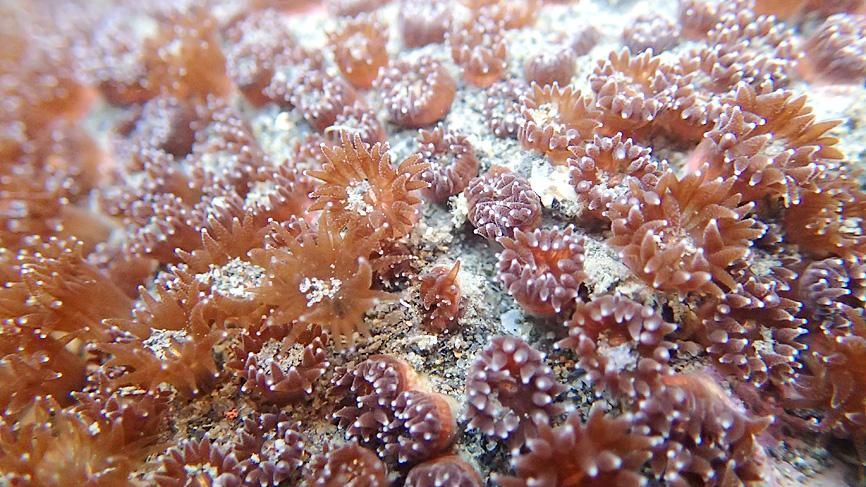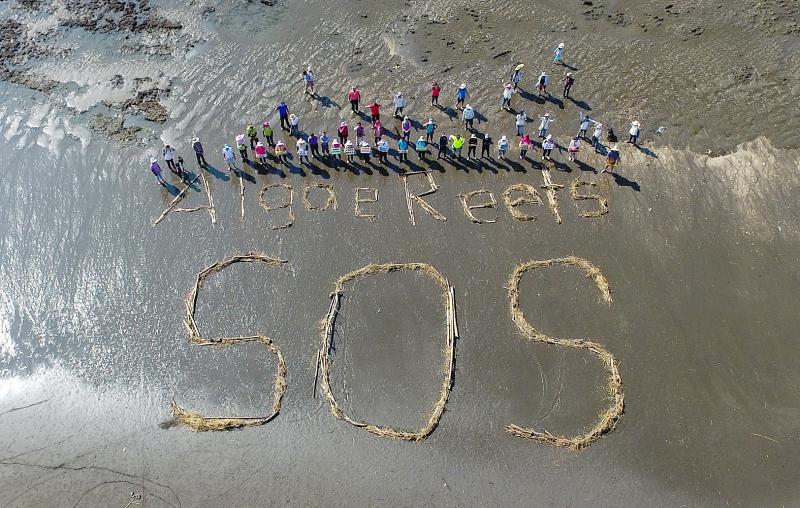Taipei Times: What prompted the referendum campaign?
Pan Chong-cheng (潘忠政): We have endeavored to protect the algal reef in [Taoyuan’s] Datan [Borough] (大潭) since 2012, at the time focusing on the Guansin (觀新) area under the impression that the front portion [the Guantang (觀塘) area] had already been largely polluted and Guansin was the only area remaining where the algal reefs could still be salvaged. After successful rescue work [having Guansin designated as a wildlife reserve], we learned that Guantang could possibly be chosen to house a third liquefied natural gas (LNG) terminal.
In 2014, we were alerted that the algal reefs in Guantang might be thriving, and we concluded that they needed to be conserved, too, after research proved they were in fine condition.

Photo courtesy of an environmental protection group
We had counted on support from [then-Democratic Progressive Party (DPP) Taoyuan mayoral candidate] Cheng Wen-tsan (鄭文燦), who during his campaign had pledged to protect the algal reefs, stating that “all Taoyuan’s natural coastline should be designated a temporary nature conservation area.”
However, when we met two weeks after he was elected, he was reserved about the matter. As the local government was reluctant to designate Guantang a conservation area, we took the issue to the central government, but to no avail.
Meanwhile, the LNG project proceeded to the environmental impact assessment.

Photo courtesy of the Rescue Datan’s Algal Reefs Alliance
On July 3, 2018, an environmental impact assessment task force rejected the project, concluding that the development of an industrial port at the site would severely threaten the coral and algal reef ecosystems. In the past, the environmental impact assessment grand assembly would affirm suggestions made by the task force, but in this case the assessment was overturned — a result of political maneuvering.
We did not give up; we went on to file six administrative lawsuits. The thing is, litigation can take time, so initiating a referendum was the only option remaining that would enable us to protect the algal reefs in a timely fashion.
There are many people I am thankful for over the course of our campaign. Aside from the volunteers, many of whom are college students and young people, numerous academics, such as Allen Chen (陳昭倫), a research fellow at Academia Sinica’s Biodiversity Research Center, and Lin Hui-chen (林惠真), a professor at Tunghai University’s Department of Life Science, have [proven the] undeniable ecological value of the Datan area with their findings that lay the foundation on which we strive forward.
TT: You have said that “it would be this generation’s sin if we fail to conserve the algal reefs for future generations.” Why did you phrase it in such strong words?
Pan: The algal reef is like the “nourishing room of maritime life,” providing a similar function to that of corals.
Datan is distinctive because it is a shallow-water algal reef ecosystem. You might find algal reefs in the Mediterranean Sea, but you would have to dive 20m deep. What we have here are much more approachable, in that you can spot them when the tide subsides, stretching 27km along Taoyuan’s coastline, and still growing.
The crabs here are far more diverse than in Kenting (墾丁), with more than 50 species. The area also hosts a population of caryophillid coral, Polycyanthus chiashanensis, a critically endangered species that is found only in Taiwan.
Researchers also documented more than 24 kinds of algae, 19 of which are new species. We have to admit that the area’s biodiversity needs to be explored further, and we would be doing a great wrong to future generations by destroying the algal reefs before we even get to know them.
Taoyuan has two fishing ports, Chuwei (竹圍) and Yunan (永安), whose fishing industries are made possible because of the algal reefs. Researchers also recorded that in June 2019 seven rare scalloped hammerhead sharks (Sphyrna lewini), about 40cm long, were caught, while in September that year nearly 100 of them were netted. They had grown to about 70cm, evidence that the algal reef is a healthy ecosystem, where the fish eggs incubated... It would be an international scandal if we destroyed the ecological habitat of such an endangered species.
TT: You describe the Datan algal reefs as a world-class ecological asset. Has any international group lent support to its conservation?
Pan: Our researchers have already published four papers on the subject in international journals.
After we forwarded our findings to Mission Blue, an international marine conservation group, in its reply in March 2019 it confirmed the necessity of preserving the Datan algal reefs and declared it the first “Hope Spot” in the East Asian region. Per our request, Mission Blue founder Sylvia Earle wrote an open letter to President Tsai Ing-wen (蔡英文). In our follow-up with the Presidential Office, it said it had instructed the Oceanic Affairs Council to respond to Earle, and when we requested the contents of its reply, the council said it could not be made public due to privacy issues. What baloney.
TT: The government says it has reduced the area to be developed, avoiding the algal reefs. What is your response?
Pan: A meme put out by the Ministry of Economic Affairs contained inaccurate information; as a matter of fact, it in part ended up largely boosting petitions in support of our referendum campaign. It keeps stressing it has reduced the development area from 232 hectares to 23 hectares, touting it as a giant blessing. However, what was reviewed in the environmental impact assessment was not the industrial zone, but the industrial port.
The port covers 913 hectares, the size of which would cause enormous damage to the ecosystem, but the government is keeping mum about it. It keeps saying it has avoided the habitat, but the truth is it is damaging an even bigger algal reef area of more than 300 hectares outside the industrial zone [to make way for the industrial port].
The government said it would take 11 years to relocate the project, which would result in power shortages and it would fail to meet its goal of a nuclear-free homeland by 2025. The thing is, if Cheng, back in 2014 when he was first elected Taoyuan mayor, had asked the central government to seek an alternative site for the LNG project, by now the development plan’s [relocation to] Taipei Port would have been on schedule with the government’s 2025 deadline.
In 2018, the government said an absence of a third LNG terminal would affect the nation’s energy reserve capacity by 2.5 percent, but most recently the economic affairs minister said the impact would be 6 percent. Which figure is correct? The fickle responses, in addition to the repeated claim that Datan is the only option available [for the LNG project], serve only to make the public think that there might be something fishy going on.
TT: Some have accused the alliance of caring only about reef conservation and not the nation’s economy or energy development.
Pan: The government cites [this] in its repeated claim that there are no alternatives, but are there really none?
I believe there are other options. For example, the government could build a floating storage regasification unit, and encourage the public to conserve electricity.
In its assessment in the early years, CPC Corp, Taiwan concluded the Guantang area was unfit for the project, with its former chairman Chang Tzu-yuan (張子源) having said that Guantang has bad sea conditions, large tidal range and so on, so why has Guantang become the only option now?
TT: Some have said that the proposed referendum disguises a hidden agenda supporting the activation of the mothballed Fourth Nuclear Power Plant, and that the whole campaign is a political maneuver by the Chinese Nationalist Party (KMT), which has spoken out in support of preserving the reef. What is your response?
Pan: Our motivation for the referendum campaign has always been pure and simple: the hope of leaving fine natural assets for future generations.
When the petition picked up steam, we started to encounter more assaults from trolls branding us as pro-nuclear, a flank of the KMT and even comrades of the Chinese Communist Party.
If the rumor of “supporting the reef referendum means supporting nuclear power” was initiated by trolls associated with the governing party, it should be morally condemned. The alliance has always been against nuclear power; framing us with such sophistry would only arouse more resentment toward the governing party.
In the course of the campaign, we saw news organizations saying that the executive branch sought to impede us from gathering the required number of signatures... Such attempts struck me as very undemocratic... The DPP, Green Party and the like were the ones who actually inspired our environmental awareness back then when we contested the KMT government’s policy; we were allies. It is ironic that now that it [the DPP] holds power, it has seemingly become the butcher of our environment.

The Grand Hotel Taipei on Saturday confirmed that its information system had been illegally accessed and expressed its deepest apologies for the concern it has caused its customers, adding that the issue is being investigated by the Ministry of Justice Investigation Bureau. The hotel said that on Tuesday last week, it had discovered an external illegal intrusion into its information system. An initial digital forensic investigation confirmed that parts of the system had been accessed, it said, adding that the possibility that some customer data were stolen and leaked could not be ruled out. The actual scope and content of the affected data

DO THEY BITE IT? Cats have better memories than people might think, but their motivation is based entirely around the chance of getting fed Cats can remember the identity of the people who fed them the day before, Taipei-based veterinarians said on Friday, debunking a popular myth that cats have a short memory. If a stray does not recognize the person who fed them the previous day, it is likely because they are not carrying food and the cat has no reason to recognize them, said Wu Chou Animal Hospital head Chen Chen-huan (陳震寰). “When cats come to a human bearing food, it is coming for the food, not the person,” he said. “The food is the key.” Since the cat’s attention is on the food, it

A New York-based NGO has launched a global initiative to rename the nation’s overseas missions, most of which operate under the name "Taipei," to "Taiwan Representative Office (TRO)," according to a news release. Ming Chiang (江明信), CEO of Hello Taiwan, announced the campaign at a news conference in Berlin on Monday, coinciding with the World Forum held from Monday through Wednesday, the institution stated in the release. Speaking at the event, Democratic Progressive Party Legislator Huang Jie (黃捷) said she believed this renaming campaign would enable the international community to see Taiwan

TOO DANGEROUS: The families agreed to suspend crewed recovery efforts that could put rescuers in danger from volcanic gases and unstable terrain The bodies of two Taiwanese tourists and a Japanese pilot have been located inside a volcanic crater, Japanese authorities said yesterday, nearly a month after a sightseeing helicopter crashed during a flight over southwestern Japan. Drone footage taken at the site showed three bodies near the wreckage of the aircraft inside a crater on Mount Aso in Kumamoto Prefecture, police and fire officials said. The helicopter went missing on Jan. 20 and was later found on a steep slope inside the Nakadake No. 1 Crater, about 50m below the rim. Authorities said that conditions at the site made survival highly unlikely, and ruled